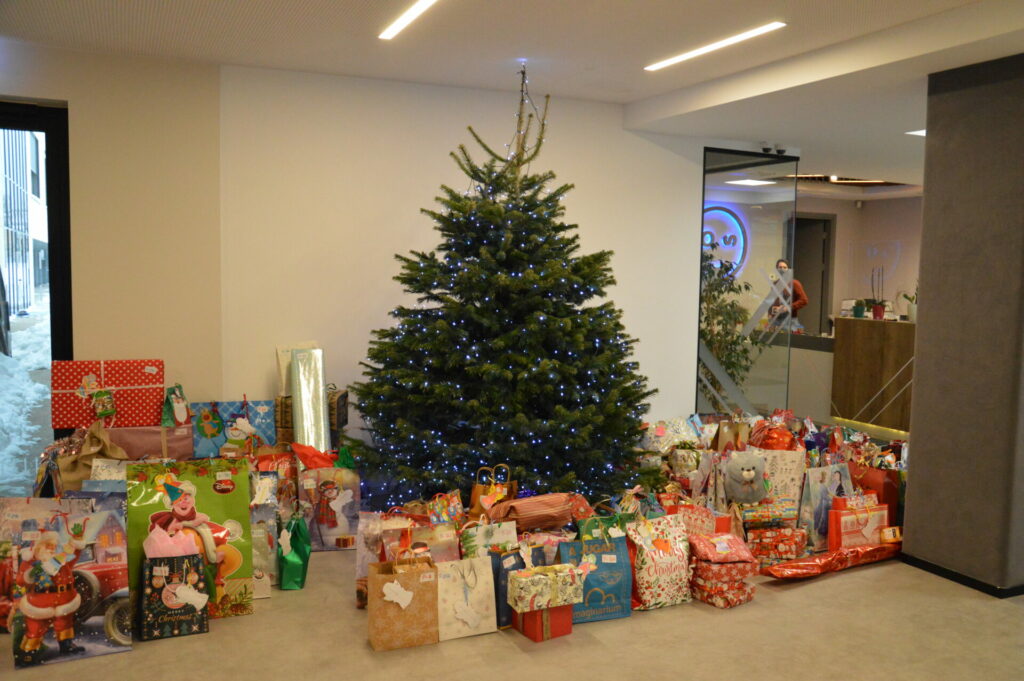Gift giving as a tradition to promote an inclusive society
Child to child, family to family – a 22-year-old tradition of gift giving from The International School of Latvia to the Children’s Palliative Care Association.

This year has been full of challenges. The students and staff of ISL are excited for the opportunity to work and study together, face-to-face, under one roof. This feeling of togetherness and joy encourages the students and parents of the International School of Latvia to take part in one of the school’s longest-standing traditions, the “Angel Tree”. For 22 Years, the International School of Latvia has been providing gifts for the families of the Children’s Palliative Care Community. Each year, this tradition not only warms the hearts of the givers and the recipients, but also promotes and practices inclusive community values such as respect, cooperation, tolerance, helpfulness and empathy.
International School of Latvia director Ronelda Capadona: “I am delighted to be part of such a long-lasting tradition at ISL. As a community we are modeling our mission and values with our minds and hearts. One of our core values is caring – to support people around us and care for those in need. I am so thankful to our families, students, staff and teachers for supporting our Angel Tree project for the last 22nd year.”
An old friendship
“It seems that the term old cannot be attributed to the number 22, however, we, the Children’s Palliative Care Association’s Team and families, appreciate our cooperation with The International School of Latvia during all these years. Nowadays, when such a rapid change of events takes place, it is of great value to know that you have a supportive, engaging friend who every year brings joy to families with terminally ill children,” says the Chairman of the Palliative Care Association Anda Jansone.
Back in 1999, in collaboration with Betsy Hanselmann, a representative of The International School of Latvia, angels were made with the names of the patients of the Children’s Palliative Care Association, which were hung on a Christmas tree, and each child of the school chose one to give a gift to. Well, this tradition of gift giving has grown into a long-term cooperation, and the angels in the Christmas tree inspired the charity movement “Angel Tree.”
The annual charity events take place twice a year – in winter this is “Snowing Angel Tree” and in spring “Blooming Angel Tree” – in the framework of which donations are collected for the provision of comprehensive care for terminally ill children at home.
See further
The tradition of The International School of Latvia shows a great perspective – what can be achieved by leaving your own world and getting involved in other people’s worlds. It makes it possible to understand that one’s own worries and challenges may not always be as important as other people’s struggles. We all know how great it is to receive gifts. However, the joy of acquisition is short-lived. Our lives together are richer, and inner joy comes from helping others improve their lives.
Joy and gratitude for seemingly little things
What brings happiness into Palliative Care Children’s family’s life on a daily basis? Here are some sources of family happiness:
- Every day we enjoy being together, having walks and a cup of delicious coffee in the morning.
- Be loving to each other. Nature. Fulfillment of wishes.
- Music – Mozart’s violin concerts – and walks with the baby in the fresh air give us joy every day.
- We are all very happy if Saverio (the child) is feeling well.
- We enjoy every minute of our lives.
- Our family’s dream is so that our two little daughters could talk.
- It’s a pleasure when boys are waking up. Those children’s morning smiles, laughter, everyday love is very recharging! The day is wonderful, no matter how tired we are!
- In fact, we are extremely happy when David feels good – laughs, runs, rejoices. It really is the best that can be!
These are the sources of joy that make us find common ground and appreciate what is given, appreciate the small things and events, because they shape our present, the future and also the world in which we live.





